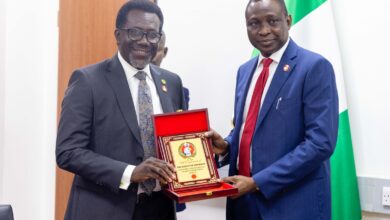AfCFTA to Change Regulatory Landscape For Intra-Africa Trade

Grace Muradzikwa, Commissioner, Insurance and Pensions Commission, Zimbabwe
By Africa Ahead
Keeping abreast of regulatory developments is a key component of the G for governance in ESG but can be a challenge for those who offer insurance or reinsurance across borders in Africa, where more than 50 regulators have their own set of rules and regulations. Now, the Africa Continental Free Trade Agreement (AfCFTA) is set to change the regulatory landscape with a goal of opening all borders for intra-Africa trade.
A recent survey revealed that more than 90% of CEOs, across all sectors, believe the agreement will boost their businesses, but what of insurance? At a roundtable hosted by Continental Reinsurance, we asked some of the regulators for their opinions on how it might work and what a difference it might make.
Regulators definitely have the Africa Continental Free Trade Agreement (AfCFTA) on their radar and it has become an agenda item when the insurance regulators from across Africa meet at a range of forums.
As members of the SADC Committee of Insurance, Securities and Non- Banking Financial Authorities (CISNA), for example, regulators meet and discuss the new trade agreement and its likely impact on insurance.
However, as Grace Muradzikwa, Commissioner at the Insurance and Pensions Commission (IPEC) in Zimbabwe, explained: “Our conversations are very nascent but we are aware that we need to bring this conversation up and to explore it thoroughly.”
One of the challenges, the group agreed, is that at government level there are different ministries taking a lead on AfCFTA. For example, in Zimbabwe it is being spearheaded by the Ministry of Foreign Affairs, while in Namibia it is being led by the Ministry of Trade.
One of the challenges this poses is in ensuring continuity in terms of discussion and implementation.
However, for the regulators there are some other key questions. As Ms Muradzikwa explained: “Our role as regulators is to make sure our own markets are ready for whatever lies ahead.” Key to this, she said, is understanding how much the insurance and reinsurance CEOs are adapting and what their understanding is. She fears that little preparation is underway and potentially there has been little discussion internally within insurance entities on either the challenges or the opportunities ahead.
Georgina Shadaya, executive assistant to the Commissioner at Zimbabwe’s IPEC, said that at government committee level, there is some involvement of the financial services, with representatives from both insurance and banking on a committee. But again, she stressed, it is still at a very early stage of development.
For Grace Mohamed, GM: insurance and medical aid funds at Namibia’s regulator Namfisa, the whole continent is at “a nascent stage”. Before much can happen, she believes, there will need to be work on a framework to harmonise the model laws to ensure uniformity of approach.
Once there is an understanding of the similarities between laws, then work can begin on any harmonisation, she said. However, she warned that countries are at very different stages of implementation, so that work could take some time, to bring all 54 states together.
“The first thing [we need] has to be political buy-in,” she stressed.
How might harmonisation work in practice?
For the regulatory group, there was broad agreement that any continent-wide change is likely to change rstly at a regional level. Ms Mohamed pointed to work already underway within the east African region and suggested that it might be re ected in similar work within the southern Africa community in SADAC.
Zenabe Daman, deputy chief executive of cer at the Financial Services Authority (FSA) Seychelles, agreed.
She said that, in Seychelles, the conversation is being held at ministerial level and has yet to lter down to the insurance sector. However, it is something that the FSA is beginning to discuss internally and with regulators from across the continent through bodies such as CISNA.
She believes this will be how change is forged as smaller groups work on solutions and then bring the conversation and ndings to continent level.
Farrah Cedras, manager supervision, insurance gambling and pension supervision section at the FSA, added that Seychelles also falls under both CISNA and SADAC, so is part of any conversation at that level.
The country’s insurance laws are also under review and that might allow the regulators to include any elements required under AfCFTA –
although the pair stressed that would be some way off.
Gabon-based Alain Fangman Ouattara, Commissaire Contrôleur Général at the Conférence Interafricaine des Marchés d’Assurances (CIMA), said that CIMA
– the group of 14 Francophone African states that has signed up to the International Conference of Insurance Controls – said AfCFTA was also on the radar of the CIMA group.
As a group that has a single set of rules governing its 14 insurance markets, CIMA could be taken as an example of the way forward for AfCFTA. However, Mr Ouattara stressed that CIMA was originally designed to focus on motor insurance and ensure uniformity across the region.
As the group agreed, there is plenty of work to be done but models exist and regional groupings may well ultimately make it easier for individual countries to adapt to continent-wide regulations.
What about the timing?
Many countries across Africa have actually been increasing trade barriers in a bid to ensure money derived from insurance bene ts the local economy and is not simply shipped overseas.
Regulators across the continent have been tightening and enforcing existing local content rules, so some have questioned the timing of the AfCFTA in terms of coming at a moment when, post-Covid, governments are striving to shore up and strengthen their economies.
Ms Mohamed was among the regulators who admitted the AfCFTA had come on them “a bit suddenly”, given the other factors impacting local economies.
Having said that, she stressed that the agreement should be seen as an opportunity and that it should facilitate growth in the insurance markets.
“There is no issue that there will be bene ts for the insurance sector,” she said, “and some classes of business will bene t particularly from a pan-African approach.”
Agriculture could be one of those, suggested Ms Muradzikwa, where a pan-African approach could produce some of the solutions needed to make it a viable product, particularly at the microinsurance level, which should serve the many millions of smallholder farmers.
“Africa is struggling with such low levels of insurance penetration,” she said. “If AfCFTA can lead to some innovation across the board, it would stimulate growth across the continent.
“It could also help with much-needed capacity building.”
However, Ms Muradzikwa also believes it is a huge opportunity for the continent’s reinsurers to grasp.
“Our own reinsurers are going to have to learn to swim with the big fish,” she suggested.
By having strong reinsurers across the continent, the group agreed, reliance on multinational players could diminish and that, ultimately, would result in more premium being retained on the continent, without the need for local content laws.
There was a belief among the regulators that nothing will happen unless the reinsurance sector steps up. “It is a case of throwing ourselves into the deep end,” said Ms Muradzikwa. “We need to be having the conversation about AfCFTA now, because they are some very serious implications.” Ms Cedras agreed, adding: “From the point of view of a smaller market, and one with very low levels of insurance penetration, we also need the conversation about how to make changes because we are not ready for that and we need to address how to manage any upcoming shifts in the market.”
Mr Ouattara pointed to the way the market has had to adapt to sudden changes through history. “Take the coup d’etat in Mali, it gave us some immediate headaches from a regulatory point of view,” he explained.
“Therewasarealimpactontheinsurancemarket because of the existing cross-border trade with goods being transported down to the ports. It was not just motor covers but the trade insurance too,” he said.
There had been a similar upset when Guinea and Burkino Faso were banned from Ecowas, Mr Ouattara added, but once insurance solutions were found, it enabled trade to recover and ensured those with large investments in the region did not lose everything.
The way that insurance enabled trade should be an example of what good work can be done with AfCFTA, the regulators agreed.
However, one of the reasons why insureds want insurance from outside of the continent is that some jurisdictions look at the sovereign rating, not the entity rating. It is something we need to sort out they want to have insurance written on A-rated paper – something that’s hard to nd at a local level.
“Some jurisdictions look at the sovereign rating not the entity rating. It is something we need to sort out,” urged Ms Mohamed. “We have a responsibility to ensure insurers are able to pay their claims and the ratings are part of the due diligence – but are the rating systems t for purpose in an African context?” she asked.
“We have good, solid insurance entities on the continent but that is irrelevant if the sovereign ratingispoor.”
The regulators agreed that this was an issue to be explored more fully when the regulators next have the opportunity to meet. But they equally agreed that it was critical investors and insureds alike could have con dence in whatever system existed.
They understood that the perception of the continent can be poor for outside investors and the rating system provides a level of comfort, but they also agreed a better solution might exist.
Ms Cedras added that there is always a balance to be struck. “If investors want to make money from the continent, they also have to be prepared to meet us halfway,” she suggested.
Can you learn from others? While those attending the roundtable were primarily based in the SADAC region, there was a feeling that there is a lot of good practice already in existence on the continent and plenty of available solutions if regulators were able to adopt best practice from elsewhere.
Ms Muradzikwa, for example, pointed to the east Africa regulators. “Having just attended a forum of eastern African insurance supervisors, I realised there is a lot to learn,” she said. “It was really interesting to see the way in which they exchanged information on statistics and performance, as well as on the issues that they are facing in individual jurisdictions.”
She was very sure similar conversations take place within CIMA and suggested that other regulatory bodies had plenty to learn from the way these groups were operating.
She suggested that there will be an amount of “diving in” as regulators make changes and adapt to the new regime. “It will require our insurance and reinsurance entities stepping up because the AfCFTA has thrown us all into the deep end,” she added.
“Most regulators are on the same page when it comes to understanding AfCFTA,” said Ms Mohamed. “We do align ourselves with international best practice already and most of us are pleased to do that.”
However, she said there are some other issues to tackle, including things like anti-money laundering (AML) regulations, which are handled in differing ways across African jurisdictions, but which will need to be harmonised ahead of any functioning trade agreement.
Above all, the regulators stressed, their core function is – and has to remain – ensuring the insurance entities are t for purpose so that policyholders will always get their claims paid. “We cannot ignore that,” said Ms Muradzikwa.
Alongside handling AML concerns, the regulators also want to ensure that the payment platforms work in harmony, so that everyone is able to get paid correctly. “We need an understanding of how money is moved around and how it would function under AfCFTA if we are to ensure our policyholders remain protected,” added Ms Muradzikwa.
Overall, the regulators agreed that the conversation on AfCFTA has only just started but it is one that they said is essential for a successful future and if the African insurance market is to grow effectively.
“It already has a place on the agenda,” said one, “and that can only mean we spend more time thinking about it, thinking about how it might function and how it will bene t the insurance sector and its customers alike.”





